- Home
- J. Robert Kennedy
Payback Page 3
Payback Read online
Page 3
We’re full, sorry.
The cities were being paid attention to while those in the north, traditionally not supporters of the government here in Freetown, were being ignored.
Silence us all through death.
He had been a loyal soldier, and still was in a way. He loved his country, believed things were getting better, but more for those who were in the cities. The rural areas were left to their own devices to solve their problems. He understood that the Ebola treatment centers had to be placed where they were most needed, but to completely abandon the rural areas was inexcusable.
They had to at least provide them with supplies, some aid workers to at least provide advice.
But his village had been abandoned, even the local government representatives leaving to stay at a military base to avoid the virus and the questions.
And now his daughter was sick.
Five years old.
Already devastated by the death of her mother and brother, she was too young to understand what was going on and it tore at his heart. Enough so that he was here today, committing what in most people’s eyes would be treason.
Unless they had been placed in an impossible situation like he had, and had the resources he did at his disposal.
And that was men.
Loyal men.
Men that were willing to die for their cause.
And eleven already had.
One thing about living in a poor country with traditionally large families was that it was almost guaranteed you had relatives in the United States. Over the past twenty years many from his village and the surrounding area had given up and emigrated, most to America. Almost anyone who had managed to get an education was gone. It was a brain drain that the great Western democracies refused to acknowledge. They sought out those with skills they needed, and took them from the poor countries that needed their expertise even more.
It should be a crime against humanity to take a doctor from a third world country.
The only advantage of losing the youngest and brightest from their poor communities was they sent money home. That hard currency gave their poor relatives, unlucky enough to not have the skills that the West desired, a chance to buy the essentials of life.
But nothing could buy the care needed when Ebola struck.
Treatment centers couldn’t be bribed, not with Western doctors controlling the intake process, and there just wasn’t enough room even if they could.
The situation was desperate, especially in his village where nearly a quarter of the population was either sick or caring for someone who was.
His wife and son were among the first to die.
And it was all so unnecessary.
The West had the money and the expertise to solve this. But because it was Africa, because they were black, and because they didn’t have oil, the reaction had been slow. Sure there were now British and Canadian troops along with dozens of aid organizations setting up new facilities in his country, but it had taken six months to get a reaction.
Thousands had died, tens of thousands more would still die.
All because it hadn’t been an interesting enough story for the news stations to cover.
And someone had to pay.
It was a decision he hadn’t come to lightly and today was the second part of his plan, the first part carried out last night in Washington by his brother and several others from his village and the surrounding area who now lived in the United States.
Vice President Okeke was now dead.
And so were his brother and friends.
But they died for a purpose, a purpose no one in America knew.
But when his plan was complete, it was a purpose no one in America would ever forget.
Then maybe they’ll pay attention.
They rounded the corner, the vehicle bouncing over a large pothole, jarring his entire body painfully. He pointed ahead. “There it is.”
His driver nodded, the dockyards just ahead.
Dockyards loaded with medical supplies from a slowly awakening America.
Hastings Ebola Treatment Center, Freetown, Sierra Leone
Dr. Sarah Henderson shoved her knuckles into the small of her back and kneaded the sore, aching muscles. She had only been here three weeks and had planned on an eight week tour, but the physical toll was already making its presence felt.
But it was nothing compared to the mental one.
She had seen death in her line of work, too much death. As a volunteer for Médecins Sans Frontières, or Doctors Without Borders, she often found herself in war zones. She tried to give two months out of every year to the organization founded in 1971 by a small group of French doctors who had worked together during the Nigerian Civil War, it now a widely recognized and respected organization she was proud to contribute toward both monetarily and with her time.
But this was something different, something she had never dealt with before.
Ebola.
Every day in the treatment center where she was volunteering dozens died, dozens more were brought in to fill the freed up beds, and even more were refused at the door, there simply not enough room.
Which meant those infected were sent home to die, and worse, to infect their loved ones.
It was heartbreaking.
Entire families were being wiped out, quite often because one of them made the uninformed mistake of helping an infected neighbor take a family member to a treatment center, exposing themselves to the deadly disease.
Fear was the enemy, fear was one of the greatest causes of the spread.
If only anyone who thought they or a loved one might be infected told the authorities, and quarantined themselves, they might actually break the back of the pandemic, but there was little hope of that. People were terrified of what their neighbors might do to them if they revealed one of their own was sick, so they kept them hidden away, but without proper protocols, they too were almost guaranteed to become infected.
Thousands were dead, thousands more were dying, and if things continued unchecked, the Centers for Disease Control was predicting over a million cases within months.
And if it hit those numbers, there was no hope in saving these people.
She feared the solution, should it reach those proportions, would be for the Western nations to completely pull out then isolate the countries so the population would simply die off, the disease’s incredible mortality rate its own greatest enemy.
But for now she was here, on the frontlines, doing her duty as a doctor, fulfilling the Hippocratic Oath she had so proudly taken just ten years ago. She was trying to stem the tide against overwhelming odds, working sixteen hour days to save those brought in early, to comfort those who were too far gone. She cried herself to sleep the first week, but now she was becoming numb to it all.
And it scared her.
Would this experience change her so much that she no longer was affected by the death of her patients? She was an Emergency Room surgeon in Los Angeles which meant she was constantly faced with death from gunshot wounds to stabbings. But back home there was always somebody to blame.
Here there was no one.
It was a disease.
And the only real way to save someone was to throw everything modern medicine could offer at each individual patient.
Which was simply too expensive.
The individual cases in the United States that had been treated—and not all successfully—cost over one million dollars each on average. An insane figure that would overwhelm even the richest of countries should it face tens of thousands of victims like these poor African countries were dealing with.
And yet she did her small part.
She knew in the grand scheme of things it made little difference, her efforts merely a finger in the dyke. But tens of thousands of fingers could make a difference, especially with the right equipment and facilities.
They didn’t need modern hospitals, they needed beds, manpower, and isolation equipment. They neede
d locals to properly dispose of the bodies, to provide the nursing efforts, to properly transport the sick to the quarantine centers.
Which meant they needed to be trained, and paid well for the risks they were taking.
Money was beginning to pour in, but money was of little value without manpower and supplies. Experimental vaccines and treatments were fantastic, but if there were only a few thousand samples in existence, what good was it?
She bent over, touching her toes, not an easy task in her personal protective equipment. She felt the tension slowly ease from her muscles, knowing that soon the pain would be back, and worse.
“Are you okay, Dr. Henderson?”
She turned her head, still bent over, and looked up at Doctor Tanya Danko, her voice muffled from her suit. She smiled as she straightened up. “I’ll live.”
Tanya looked at the long line of beds, all full.
“I’m afraid few of them will.”
Tanya was a short-timer. She was due to leave in two days, returning to her native Ukraine only to probably deal with more carnage.
But at least there they had someone to blame.
Russia.
And that was what she hated so much about this disease. There was no perpetrator, no weapon with a human at the end of it.
And it didn’t choose its victims because they were from some ethnic group, some political leaning.
It didn’t care whether or not you were a doctor or a dock worker, a mother or a child, black or white.
It just killed.
Sarah stood for a moment, watching the nurses administering to the patients, shaking her head. “I’m afraid you’re right.”
“If only we could get more people who’ve been cured to donate their blood, we might be able to stop this.”
Sarah nodded. Tanya was right, though it would be a slow process. It was at the moment the most effective treatment. Take the blood from those who survived, and give it to those who were sick. The transfusions would transfer the antibodies built up in the healthy survivor into that of the infected, and quite often cure them.
Which meant their blood could then be used.
But each survivor could only donate so much blood, and it took time for those cured to recover enough to actually provide the blood.
Eventually the treatment would win out as a critical mass of people survived.
But how many tens if not hundreds of thousands would die first?
“There’s just too many,” she said, her shoulders slumping. “We’ve got two hundred patients here and only four getting transfusions.”
Tanya motioned toward the four who were nearest them. “Those four will hopefully survive, and provide blood for four more. The four who provided blood for these four will also provide more. Those eight will then provide blood and so on.” Tanya placed a gloved hand on Sarah’s shoulder. “Don’t lose hope yet, Sarah, you’ve only been here a few weeks.”
Sarah shook her head. “I don’t know how you’ve kept your optimism through all this. Eight weeks!”
“I was like you when I first arrived. Overwhelmed. Completely. I lost track of how many tears I shed. It’s the children dying that I think get you the most. If I could, I’d stay here until it was over, but I have a family back home and I miss them.”
Sarah sucked in a deep breath then sighed, her eyes filling with tears as she pictured her husband, Steve, and their little boy, Tommy. Tommy was twelve, old enough to claim to understand why she had gone, but she wasn’t convinced he really understood. He hadn’t cried at the airport, but his lip had trembled and his eyes had watered.
But he hadn’t sobbed.
Steve told her after she had cleared customs and given them a final wave before heading to her gate, that Tommy had cried the entire way home from the airport. Only a trip through the McDonald’s drive thru had settled him down.
And then only for a few minutes.
A tear rolled down her cheek.
“I miss my family too.”
“Don’t you start crying otherwise I will too, and there’s no blowing our noses in these infernal outfits.”
Sarah laughed, sniffed hard and rapidly blinked her eyes clear. “You’re right. Don’t we make a good pair? Better not let the men see us or they’re going to think we’re the weaker sex.”
“Bah!” cried Tanya, batting her hand. “I saw Jacques heaving this morning. They’re not tougher than us.”
Sarah chuckled. “Couldn’t have happened to a nicer guy.”
Tanya punched her gently on the shoulder. “Sarah!”
Sarah shrugged. “Sorry, but that guy’s an asshole. There isn’t anything with a heartbeat and a vagina around here that he hasn’t hit on.”
Tanya snorted, bending over slightly as she stifled a laugh. “He hit on you too?”
“I think wedding bands just attract the pig.”
“Too true, too true.”
Sarah looked at the clock on the nearby wall. “Looks like our shift is over. Dinner?”
“Absolutely, I’m famished. I wonder what’s on the menu tonight.”
“Nothing good, I’m sure.”
“They try.”
“I know, I know. But I’d kill to have grilled chicken on a bed of fettuccini just oozing with a creamy alfredo sauce.”
“Oh woman, you’re torturing me.”
“And myself. At least you’re leaving soon.”
“I can’t wait to have some home cooked meals, even if I’m the one who has to cook them.”
They stepped through the first door of the isolation chamber, one of the local staff beginning to hose her down with a soapy spray. “Steve does most of the cooking at our home.”
“Lucky girl.”
“Yeah, he’s way better at it than me. I do toast and coffee well, but that’s about it.”
“My mother raised me to cook. I love it. With my job though it does make it hectic sometimes.”
The man with the spray motioned Sarah forward, turning the chemical shower on Tanya. She stepped through another set of doors and a local began to remove her gear, a checklist being read by a second, a third watching Sarah closely to make sure she didn’t touch herself, all of the actions very deliberate, very carefully done.
This was where you’d get infected.
If you were properly covered, the chances of becoming infected were very low. But touch something contaminated with your glove, then touch your face with that glove when your headgear had been removed and you could be infected.
And become another statistic.
She stepped out of her booties and into the next chamber where she was decontaminated once again, her light clothes tossed into a basket leaving her in nothing but her panties and bra. A thorough shower and she was dressing when Tanya appeared wrapped in a towel.
Tanya tossed the towel aside, her European lack of concern over nudity still something Sarah was getting used to. “Just give me a minute and I’ll join you for dinner.”
Sarah looked away, hoping it wasn’t too obvious. “Okay, I’m going to go to my room first and see if I can get in a quick call home.”
“Okay, enjoy!”
Sarah stepped outside, the stifling heat of the afternoon now just starting to give way to what she hoped would be a cooler evening. The Doctor’s Lounge was air conditioned, but not much else was. Her room had an oscillating fan and little in the way of creature comforts.
But she wasn’t here to be comfortable.
She walked down a hallway of the repurposed police training school, opening the door to one of the classrooms. Inside she shared the room with four others, temporary walls having been put inside providing some modicum of privacy and not much of that, their acoustic shielding properties little to none.
But it didn’t matter. At the end of a hard day’s work she was usually so exhausted there was little difficulty getting to sleep.
Even when one of her bunkmates was “entertaining a guest”.
There was little to do here in the form
of entertainment. Many of the doctors were young, attractive, with no husbands or wives back home.
Which meant sex was quite often the chosen pastime.
She knew she felt the urge from time to time, but she loved her husband and it wouldn’t even occur to her to cheat on him, despite the fact he would never know.
I’d know.
And that was more than enough reason to keep her libido locked up.
She opened her door and screamed, grabbing at her chest in shock as her mind reeled for a moment at the sight of a strange man lying on her cot.
“Jacques, what the hell are you doing here?”
“Why, waiting for you, ma chérie,” he said in that thick French accent of his, an accent she had to admit was as sexy to her ears as the language of romance had been described to her.
Especially in her heightened state of arousal brought on by weeks of forced celibacy.
She snapped her fingers, jerking a thumb over her shoulder at the door. “Out. Now.”
Jacques swung his legs off the cot and rose, standing only inches from her, his body heat radiating out toward her, a furnace of passion that made her tingle where she shouldn’t, not as a married woman. “I assure you my intentions are quite honorable.”
“I find that hard to believe.”
Jacques’ hand slapped against his chest, over his heart, his jaw dropping. “Mademoiselle, I am ’urt. You of all people I would ’ave thought above believing the ’urtful gossip surrounding me. It is a reputation I assure you is quite underserved.”
She loved the way he didn’t pronounce his H’s. “I’ve heard you laying pipe to two different women this week in this very room—”
Jacques pointed to the floor with a sly grin. “This very room?”
“You know what I mean.”
Jacques shrugged. “Who am I to say ‘no’ when a woman requires the comfort only I can provide.”
The ego on this guy! Despite herself she found the physical attraction undeniable. And it disgusted her. “Only you?”

_preview.jpg) The Protocol (A James Acton Thriller, Book #1)
The Protocol (A James Acton Thriller, Book #1)_preview.jpg) Depraved Difference (A Detective Shakespeare Mystery, Book #1)
Depraved Difference (A Detective Shakespeare Mystery, Book #1) Atlantis Lost
Atlantis Lost The Tomb of Genghis Khan
The Tomb of Genghis Khan_preview.jpg) Rogue Operator (A Special Agent Dylan Kane Thriller, Book #1)
Rogue Operator (A Special Agent Dylan Kane Thriller, Book #1) Forgotten
Forgotten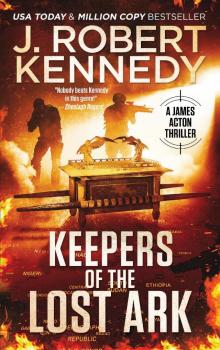 Keepers of the Lost Ark
Keepers of the Lost Ark The Cylon Curse
The Cylon Curse The Colonel's Wife
The Colonel's Wife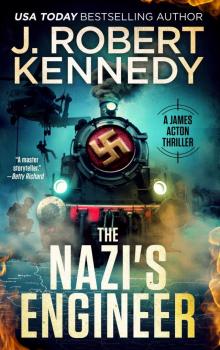 The Nazi's Engineer
The Nazi's Engineer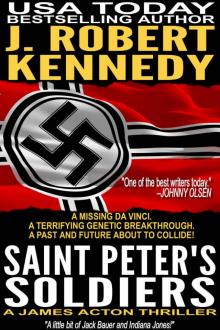 Saint Peter's Soldiers (A James Acton Thriller, Book #14)
Saint Peter's Soldiers (A James Acton Thriller, Book #14)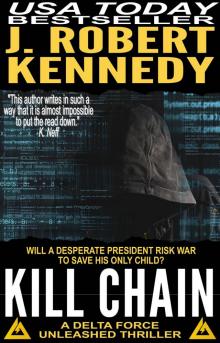 Kill Chain
Kill Chain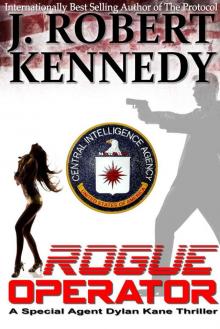 Rogue Operator
Rogue Operator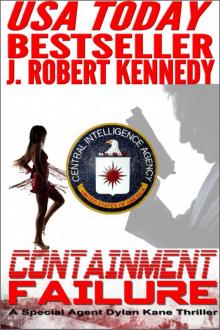 Containment Failure (A Special Agent Dylan Kane Thriller, Book #2)
Containment Failure (A Special Agent Dylan Kane Thriller, Book #2) The Lazarus Moment
The Lazarus Moment The Arab Fall (A James Acton Thriller, Book #6) (James Acton Thrillers)
The Arab Fall (A James Acton Thriller, Book #6) (James Acton Thrillers) Payback
Payback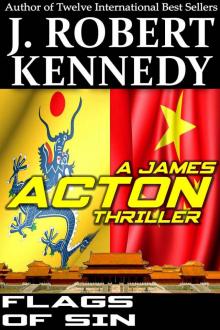 Flags of Sin - 05
Flags of Sin - 05 The Viking Deception
The Viking Deception The Templar's Revenge (A James Acton Thriller, #19) (James Acton Thrillers)
The Templar's Revenge (A James Acton Thriller, #19) (James Acton Thrillers)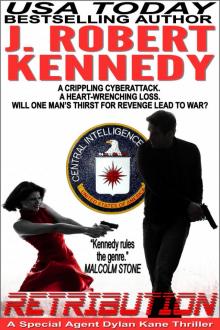 Retribution - A Special Agent Dylan Kane Thriller Book #7
Retribution - A Special Agent Dylan Kane Thriller Book #7 Tick Tock (A Detective Shakespeare Mystery, Book #2)
Tick Tock (A Detective Shakespeare Mystery, Book #2) Blood Relics (A James Acton Thriller, #12)
Blood Relics (A James Acton Thriller, #12) The Templar Detective
The Templar Detective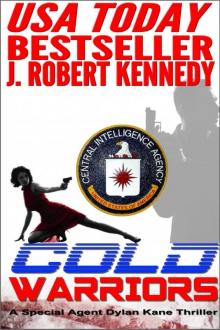 Cold Warriors (A Special Agent Dylan Kane Thriller, Book #3)
Cold Warriors (A Special Agent Dylan Kane Thriller, Book #3)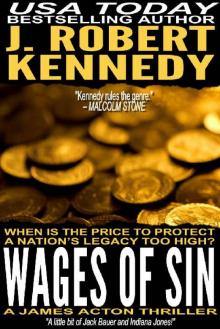 Wages of Sin (A James Acton Thriller, #17) (James Acton Thrillers)
Wages of Sin (A James Acton Thriller, #17) (James Acton Thrillers) The Templar Detective and the Parisian Adulteress
The Templar Detective and the Parisian Adulteress Pompeii's Ghosts (A James Acton Thriller, #9)
Pompeii's Ghosts (A James Acton Thriller, #9) Raging Sun (A James Acton Thriller, #16) (James Acton Thrillers)
Raging Sun (A James Acton Thriller, #16) (James Acton Thrillers) The Riddle (A James Acton Thriller, Book #11)
The Riddle (A James Acton Thriller, Book #11)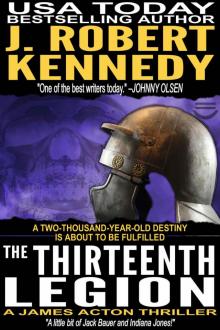 The Thirteenth Legion (A James Acton Thriller, #15) (James Acton Thrillers)
The Thirteenth Legion (A James Acton Thriller, #15) (James Acton Thrillers) Wrath of the Gods (A James Acton Thriller, #18) (James Acton Thrillers)
Wrath of the Gods (A James Acton Thriller, #18) (James Acton Thrillers) Sins of the Titanic (A James Acton Thriller, #13)
Sins of the Titanic (A James Acton Thriller, #13) Amazon Burning (A James Acton Thriller, #10)
Amazon Burning (A James Acton Thriller, #10)